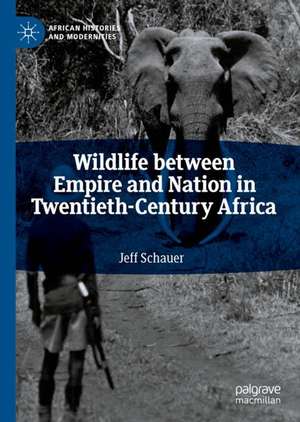Wildlife between Empire and Nation in Twentieth-Century Africa: African Histories and Modernities
Autor Jeff Schaueren Limba Engleză Hardback – 17 dec 2018
Din seria African Histories and Modernities
- 15%
 Preț: 695.01 lei
Preț: 695.01 lei - 20%
 Preț: 815.67 lei
Preț: 815.67 lei - 15%
 Preț: 577.54 lei
Preț: 577.54 lei - 15%
 Preț: 587.85 lei
Preț: 587.85 lei - 15%
 Preț: 642.51 lei
Preț: 642.51 lei - 18%
 Preț: 733.33 lei
Preț: 733.33 lei - 18%
 Preț: 734.27 lei
Preț: 734.27 lei -
 Preț: 384.09 lei
Preț: 384.09 lei - 18%
 Preț: 739.31 lei
Preț: 739.31 lei -
 Preț: 418.45 lei
Preț: 418.45 lei - 15%
 Preț: 694.69 lei
Preț: 694.69 lei - 9%
 Preț: 753.50 lei
Preț: 753.50 lei - 15%
 Preț: 641.71 lei
Preț: 641.71 lei - 15%
 Preț: 704.17 lei
Preț: 704.17 lei - 18%
 Preț: 733.33 lei
Preț: 733.33 lei - 15%
 Preț: 703.38 lei
Preț: 703.38 lei - 15%
 Preț: 527.32 lei
Preț: 527.32 lei - 15%
 Preț: 698.94 lei
Preț: 698.94 lei -
 Preț: 485.61 lei
Preț: 485.61 lei -
 Preț: 386.99 lei
Preț: 386.99 lei - 15%
 Preț: 704.87 lei
Preț: 704.87 lei - 18%
 Preț: 781.45 lei
Preț: 781.45 lei - 18%
 Preț: 894.97 lei
Preț: 894.97 lei - 15%
 Preț: 641.16 lei
Preț: 641.16 lei - 15%
 Preț: 643.16 lei
Preț: 643.16 lei - 18%
 Preț: 783.20 lei
Preț: 783.20 lei - 15%
 Preț: 643.00 lei
Preț: 643.00 lei - 18%
 Preț: 900.49 lei
Preț: 900.49 lei - 15%
 Preț: 699.59 lei
Preț: 699.59 lei - 15%
 Preț: 644.49 lei
Preț: 644.49 lei - 15%
 Preț: 587.53 lei
Preț: 587.53 lei - 15%
 Preț: 703.06 lei
Preț: 703.06 lei - 15%
 Preț: 582.63 lei
Preț: 582.63 lei - 15%
 Preț: 586.88 lei
Preț: 586.88 lei -
 Preț: 385.47 lei
Preț: 385.47 lei - 15%
 Preț: 703.71 lei
Preț: 703.71 lei - 18%
 Preț: 744.22 lei
Preț: 744.22 lei - 15%
 Preț: 590.95 lei
Preț: 590.95 lei - 15%
 Preț: 587.53 lei
Preț: 587.53 lei
Preț: 587.39 lei
Preț vechi: 691.05 lei
-15% Nou
Puncte Express: 881
Preț estimativ în valută:
112.41€ • 116.65$ • 93.96£
112.41€ • 116.65$ • 93.96£
Carte tipărită la comandă
Livrare economică 15-29 martie
Preluare comenzi: 021 569.72.76
Specificații
ISBN-13: 9783030028824
ISBN-10: 3030028828
Pagini: 287
Ilustrații: XVI, 284 p. 9 illus.
Dimensiuni: 148 x 210 mm
Greutate: 0.51 kg
Ediția:1st ed. 2019
Editura: Springer International Publishing
Colecția Palgrave Macmillan
Seria African Histories and Modernities
Locul publicării:Cham, Switzerland
ISBN-10: 3030028828
Pagini: 287
Ilustrații: XVI, 284 p. 9 illus.
Dimensiuni: 148 x 210 mm
Greutate: 0.51 kg
Ediția:1st ed. 2019
Editura: Springer International Publishing
Colecția Palgrave Macmillan
Seria African Histories and Modernities
Locul publicării:Cham, Switzerland
Cuprins
1. Introduction.- 2. Imperial Ark: Imperial Preservationists and African Wildlife.- 3. Governing the Game: Expertise, Administration, and the Making of Colonial Wildlife Policy in Uganda and Northern Rhodesia.- 4. Government Cattle: Anti-Wildlife Politics in East and Central Africa.- 5. Deferring Uhuru: Decolonization and the Coming of the Global Wildlife Preservation Movement.- 6. Pachyderms and Parks: Ecological Politics and East Africa’s National Parks.- 7. National Conservation: Kenya, Britain, and World Bank and Global Entanglements.- 8. Conclusion.
Recenzii
“Wildlife between Empire and Nation makes for interesting reading and provides with a compelling birds-eye perspective on how the politics and policies of wildlife in Africa were subject to varied twists and turns during Eastern Africa’s troubled phases of colonialism, nationalism, decolonization, and the recent neoliberal ideological shift. It further underlines the importance of local control over resources while also serving a salutary warning against the idea of managing nature principally as a global trust.” (Rohan D’Souza, Journal of British Studies, May 12, 2020)
Notă biografică
Jeff Schauer is Assistant Professor in the Department of History at University of Nevada, Las Vegas, USA.
Textul de pe ultima copertă
This book traces the emergence of wildlife policy in colonial eastern and central Africa over the course of a century. Spanning from imperial conquest through the consolidation of colonial rule, the rise of nationalism, and the emergence of neocolonial and neoliberal institutions, this book shows how these fundamental themes of the twentieth century shaped the relationships between humans and animals in what are today Kenya, Tanzania, Uganda, Zambia, and Malawi. A set of key themes emerges—changing administrative forms, militarization, nationalism, science, and a relentlessly broadening constituency for wildlife. Jeff Schauer illuminates how each of these developments were contingent upon the colonial experience, and how they fashioned a web of structures for understanding and governing wildlife in Africa—one which has lasted into the twenty-first century.
Caracteristici
Covers uniquely broad geographic and temporal frames—five countries and the entire twentieth century Documents how major shifts in the twentieth century shaped African wildlife governance in enduring ways Highlights the roles of figures such as imperial and global advocates, game wardens, park managers, hunters, farmers, nationalists, and missionaries Appeals to scholars of African history, imperial history, colonialism and postcolonial studies, and environmental history
